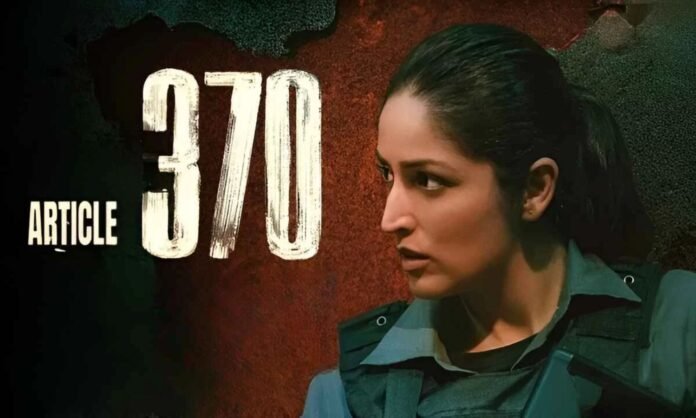Yami Gautam, the renowned Bollywood actress, has responded to the ban imposed on her film “Article 370” in Gulf countries. The movie, which delves into the sensitive topic of Kashmir’s special status, has faced censorship hurdles in certain regions, sparking a debate on artistic freedom and political sensitivity.
Gautam, known for her versatile performances, expressed her disappointment over the ban during a press conference held yesterday. In her statement, she emphasized the importance of artistic expression and the need to address complex socio-political issues through cinema. “As artists, it’s our responsibility to shed light on pressing issues and stimulate meaningful conversations,” Gautam stated firmly.
The actress further highlighted the significance of films like “Article 370” in fostering dialogue and understanding among diverse communities. She stressed that such movies serve as a medium to bridge cultural gaps and foster empathy, urging authorities to reconsider their decision.
The ban on “Article 370” has stirred controversy not only within the film industry but also among audiences worldwide. Many have questioned the rationale behind censoring a film that seeks to explore a critical aspect of contemporary Indian history. Social media platforms have been abuzz with discussions, with supporters of artistic freedom rallying behind Gautam and the film’s cast and crew.
This incident also underscores the broader challenges faced by filmmakers when addressing politically sensitive subjects. While cinema has the power to provoke thought and challenge perceptions, it often encounters resistance from authorities wary of potential backlash or controversy.
Despite the setback, Gautam remains optimistic about the film’s impact and the potential for meaningful dialogue. She affirmed her commitment to raising awareness about Kashmir’s complex socio-political landscape and advocating for dialogue and understanding.
The ban on “Article 370” in Gulf countries raises broader questions about censorship, artistic freedom, and the role of cinema in addressing contentious issues. It reignites debates surrounding cultural sensitivity and the extent to which governments should intervene in artistic expression.
As the controversy continues to unfold, supporters of artistic freedom and advocates for nuanced storytelling eagerly await developments, hoping for a resolution that upholds the principles of free speech and encourages constructive dialogue.
Amidst the controversy, Yami Gautam’s reaction has sparked discussions about the broader implications of censorship in the film industry. Many industry insiders and film enthusiasts have voiced their concerns about the chilling effect such bans can have on artistic expression. They argue that stifling creative freedom not only hampers filmmakers’ ability to address critical issues but also undermines the diversity of perspectives in storytelling.
Furthermore, the ban on “Article 370” has raised questions about the role of international relations in shaping cultural exchanges. Some analysts point to the diplomatic tensions between India and certain Gulf countries as a possible factor behind the ban. This highlights the complex interplay between geopolitics and cultural diplomacy and the challenges of navigating such dynamics in the global entertainment landscape.
In response to the ban, supporters of the film have launched online campaigns calling for its release in Gulf countries and urging authorities to reconsider their decision. The hashtag #ReleaseArticle370 has gained traction on social media, with netizens from across the world expressing solidarity with the filmmakers and advocating for freedom of expression.
Meanwhile, industry associations and human rights organizations have condemned the ban, emphasizing the importance of protecting artistic freedom as a fundamental right. They have called on governments to uphold international standards of free speech and refrain from imposing arbitrary restrictions on creative works.
As the debate intensifies, stakeholders in the film industry continue to grapple with the challenges of balancing artistic expression with geopolitical sensitivities. The case of “Article 370” serves as a poignant reminder of the complexities inherent in storytelling and the ongoing struggle to safeguard creative autonomy in an increasingly interconnected world.
Yami Gautam’s response to the ban on “Article 370” sheds light on the broader issues surrounding censorship, artistic freedom, and cultural diplomacy in the film industry. As the controversy unfolds, it prompts critical reflection on the intersection of politics and art and underscores the need for greater dialogue and cooperation to address such challenges.

